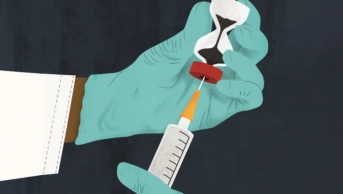
Wes Mountain/The Pharmaceutical Journal
In May 2000, the Department of Health published a blueprint for critical care in England. The ‘Comprehensive Critical Care’ white paper demanded reform, reiterating the need for a service driven by data and organised around severity of illness, with a strong requirement for collaborative working. The NHS Modernisation Agency report ‘The Role of Healthcare Professionals within Critical Care Services’, published in June 2002, added to this, describing the pharmacy services needed, outlining typical duties, arguing for clinical career advancement options and, for the first time, introducing the term ‘consultant pharmacist’ to critical care.
Consequently, in 2004, critical care pharmacists from the UK Clinical Pharmacy Association were called to work with the Emergency Care Strategy Team at the Department of Health in London. The task was to detail a career pathway for critical care pharmacists, map out the knowledge, skills and competencies required, and learn to anticipate issues that may need navigating by service commissioners. A separate project ran in parallel to describe consultant pharmacist practice. Both utilised the Royal Pharmaceutical Society’s (RPS) ‘Advanced level framework’ as a backbone. The Department of Health went on to publish its ‘Guidance for the development of consultant pharmacist posts’ in March 2005 and ‘Adult critical care: specialist pharmacy practice’ in July 2005.
It has taken more than 20 years to move from an initial vision of specialist pharmacists working in all critical care units, to a position where this expectation is articulated in standards and commissioning documents
The need for a process to robustly and reliably locate a practitioner on the framework was clear. The Adult Critical Care Specialist Pharmacy Practice working group, as part of the UK Clinical Pharmacy Association (UKCPA), drew up a process, tested it and then began applying it, going on to publish its experience in April 2011. Other specialties, such as renal pharmacy, also developed models to credential specialist practice. This combined experience was drawn together in a report titled ‘Professional recognition and professional advancement’ for the RPS in February 2013, led by the Joint Partners Credentialing Task group, to inform the development of the RPS Faculty.
Critical care itself has also developed over time. A set of ‘Core standards for intensive care units’ was drawn up in 2013, led and coordinated by the Faculty of Intensive Care Medicine (FICM) and the Intensive Care Society (ICS). These were developed to harmonise care across all critical care units in the UK. For pharmacy, this meant statements about expected level of competence, access to experienced pharmacists and skill mix. Over time, these standards evolved and became the ‘Guidelines for the provision of intensive care services’ (GPICS), first published in 2015. The most recent edition, published in 2022, was endorsed by 29 medical royal colleges, nursing bodies, allied health societies, NHS organisations and patient groups — including the UKCPA.
In England, the NHS ‘Adult critical care service specification’ for commissioners, published in June 2022, requires providers to have an advanced-level pharmacist for critical care, outlines fundamental activities to be undertaken and links commissioning requirements with the GPICS. In Scotland, quality indicators published in 2015 require patients to be reviewed by a recognised critical care pharmacist and providers must ensure there is access to appropriate critical care pharmacy expertise.
In June 2022, the RPS launched the ‘Core advanced pharmacist curriculum’, which was developed in recognition that specialist practice needed an ‘add-on’. In 2021, the RPS called for pioneer specialist groups to work towards filling in the gap left between core practice and specialist practice. Working with the RPS, supported by FICM, critical care pharmacists from the UKCPA identified two specialist areas that required further development — mental health pharmacy and critical care pharmacy.
Elsewhere, NHS England had set up the ‘Adult critical care planning programme’ to consider the likely service requirements of future surges of COVID-19, an increased demand for critical care beds and a general erosion in staff numbers and experience post-COVID surges. As part of this, a critical care pharmacy workforce strategy was produced by NHS England in December 2022. In response to the workforce development needs identified in the strategy, NHS England allocated training budget to upskill critical care pharmacy. The budget enabled procurement of short courses in critical care pharmacy, a critical care pharmacy technician course and a postgraduate critical care pharmacist course. The content of the postgraduate course is mapped against the RPS/UKCPA/FICM specialist critical care curricula, the launch of which was announced in September 2024.
It has taken more than 20 years to move from an initial vision of specialist pharmacists working in all critical care units, to reaching a position where this expectation is articulated in standards and commissioning documents — where training pathways exist with funding and centralised royal college-style specialised credentialing is available to assure the quality of pharmacists working within that service.
There is still work to do; there are not enough consultants, for example. And, despite service specifications and standards, not all geographies have the right workforce or good access to training — unwarranted variation still exists. Regardless, critical care has made great strides forward, the structures in place serve as a template for others. I sincerely hope that our pathfinding facilitates accelerated progress, so that instead of a few decades, other specialities can achieve the same, or better results, within a timespan of few years.
Mark Borthwick, consultant pharmacist — critical care, Oxford University Hospitals NHS Foundation Trust


